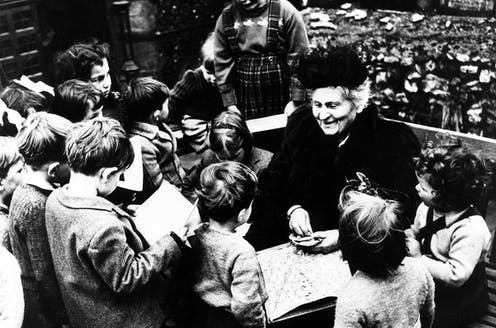A Doctor Like No Other
Born on August 31, 1870, in the small town of Chiaravalle in eastern Italy, Maria Montessori was described from a very early age as having a powerful character with a strong sense of duty and an assertive nature. True to her convictions, Maria Montessori went on to graduate from medical school and became the first female physician in Italy’s history. Dr. Montessori opened the very first casa de bambini or “children’s house” in a poor quarter of the San Lorenzo tenements. It was there that she began to develop what would later become known as the Montessori approach to the education of young children.

Her approach to education stemmed from a solid grounding in biology, psychiatry and anthropology. She studied children of all races and cultures in many countries around the world, soon seeing the universality of the laws of human development played out before her.
“A child’s work” wrote Maria Montessori, “is to create the man he will become. An Adult works to perfect the environment but a child works to perfect himself.” “The hands,” wrote Dr. Maria Montessori, “are the instrument of man’s intelligence.” From birth to six years of age, children have what she called an ‘Absorbent Mind’. During this time, children form their personality and self. Mind memory, power to understand, and ability to think through impressions gained from the environment are all constructed during this time.
The Montessori approach offers a broad vision of education as an aid to life. It is designed to help children with their task of inner construction as they grow from childhood to maturity. It succeeds because it draws its principles from the natural development of the child. Its flexibility provides a matrix within which each individual child’s inner directives freely guide the child towards wholesome growth.
Montessori classrooms provide a prepared environment where children are free to respond to their natural tendency to work. The children’s innate passion for learning is encouraged by giving them opportunities to engage in spontaneous,, purposeful activities with the guidance of a trained adult. Through their work, the children develop concentration and joyful self-discipline. Within a framework of order, the children progress at their own pace and rhythm, according to their individual capabilities.
